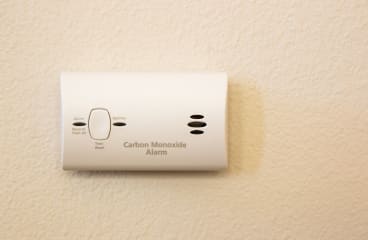
Your Care Instructions
Carbon monoxide is a gas that has no color, smell, or taste. You can't tell if you're breathing it. Your child can be poisoned from breathing air that has too much of the gas.
Many things can cause dangerous levels of carbon monoxide. These include:
- Heating systems, car engines, and generators.
- Jet ski and boat motors. A motor that is idling or working at a slow speed can be dangerous to a swimmer or someone being pulled.
- Grills, stoves, and fires.
- Running a car in the garage, even with the garage door open. Fumes can leak into your house.
- Riding in the enclosed back of a truck.
Carbon monoxide replaces the oxygen in the blood. Since the body's organs and tissues depend on oxygen, they can't work as they should.
Follow-up care is a key part of your child's treatment and safety. Be sure to make and go to all appointments, and call your doctor if your child is having problems. It's also a good idea to know your child's test results and keep a list of the medicines your child takes.
How can you care for your child at home
- If your child was exposed at home, have the home tested for carbon monoxide. Do this before your child returns to the home. Your local fire department or utility company can test it. The service may be free.
- Install a carbon monoxide detector on each level of your home and near your child's sleeping areas. Some smoke alarms also can detect this gas. If the alarm sounds, tell everyone in the house or building to get out. Then use a nearby phone to call the fire department or your local utility company.
- Don't ignore symptoms of carbon monoxide poisoning. Symptoms include headaches, nausea, and feeling dizzy.
When should you call for help?
Call 911 anytime you think your child may need emergency care. For example, call if:
- Your child passes out (loses consciousness).
- Your child is confused or having trouble thinking.
- Your child is very sleepy or hard to wake up.
Call your doctor now or seek immediate medical care if:
- Your child continues to vomit.
- Your child's headache gets worse.
- Your child is dizzy or lightheaded or feels like he or she may faint.
Watch closely for changes in your child's health, and be sure to contact your doctor if:
- Your child has any changes in vision, concentration, coordination, or behavior in the next few weeks.
- Your child does not get better as expected.
Where can you learn more?
Go to http://www.healthwise.net/patientEd
Enter E501 in the search box to learn more about "Carbon Monoxide Poisoning in Children: Care Instructions".
Current as of: October 24, 2024
Author: Ignite Healthwise, LLC Staff
Clinical Review Board
All Ignite Healthwise, LLC education is reviewed by a team that includes physicians, nurses, advanced practitioners, registered dieticians, and other healthcare professionals.

